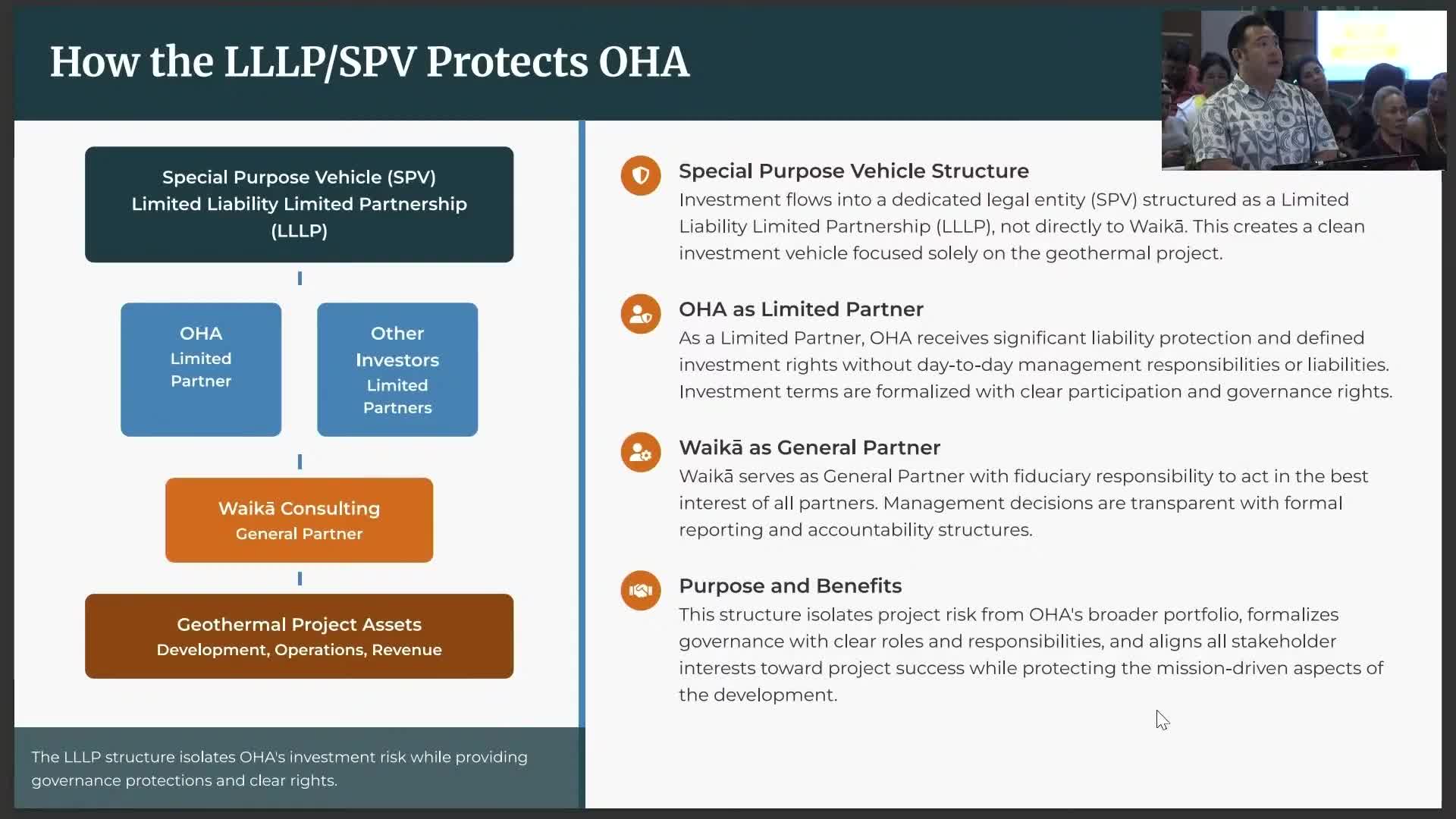Native‑led geothermal pitch prompts sharp public opposition and trustee questions
Get AI-powered insights, summaries, and transcripts
Subscribe
Summary
A native‑led geothermal developer asked OHA for a $5 million founding investment in a Hawaii Island project; the pitch prompted sharp public opposition and trustee requests for written documentation and independent analysis.
A native‑led consortium called WICA (presented under Vika Consulting) on Nov. 6 asked the Office of Hawaiian Affairs to take an early investor role in a proposed Hawaii Island geothermal project, offering a “native‑to‑native” governance model and a special purpose vehicle structure that the presenters said could yield 5–10 times OHA’s investment over decades. The presenters asked OHA to invest $5,000,000 to secure a founding limited‑partner position and influence governance and benefits.
How WICA framed the project: presenters, including former trustee Leoma L. Solomon, Kavehi Correa and Ryan Matsumoto, described geothermal as a “base load” renewable resource that could support energy independence, local jobs and long‑term revenue, and argued geothermal is legally a mineral belonging to the public/cursed lands and therefore subject to native Hawaiian interests. WICA proposed a special purpose limited partnership in which OHA would be a limited partner, WICA the general partner, and the project would pay state‑required mineral royalties (presenters cited a 20% royalty figure as a statutory benchmark). The presenters outlined a 10‑year development timeline (1–3 years exploration, 5–7 years construction), potential capacity of 50–100 MW depending on resource science, and a total project cost range they reported as $2.75 million to $750 million (the large range reflects project scale uncertainty).
Public and trustee reaction: multiple community speakers strongly opposed geothermal exploration and development on Hawaii Island and raised interlinked concerns about cultural impact, water and aquifer protection, mental health impacts of resource extraction, and the islands’ history of harmful projects. Public commenters included Bronson Azama, Terry Napiahi, Kanoy Case, Pua Case, Skye (no last name provided) and others who cited past health, cultural and environmental harms near geothermal and military sites and asked OHA to require full cultural impact assessments (CIAs), to demand free, prior and informed consent, and to prioritize public transparency. Several speakers noted the Puna geothermal experience as a cautionary example.
Trustee questions and presentation follow‑up: trustees asked about WICA’s ownership, management, and prior project experience; WICA said it is a native‑Hawaiian‑owned entity and a subsidiary of Innovations Development Group, with prior relationships on geothermal projects identified in Aotearoa/New Zealand. Trustees pressed for more documentation of principals, contracts and third‑party verification of returns. WICA’s presenters said the $5,000,000 would be placed into a special purpose vehicle and that the firm planned to seek a 5–10% equity position plus state mineral royalties. Presenters also noted that they had discussed the idea with DBEDT and the county mayor’s office and that community engagement had been part of their planning.
What proponents said OHA would get: presenters listed potential non‑financial benefits—co‑governance, cultural integration protections, job training, and revenue streams for programs—as well as projected equity upside if OHA took early risk capital.
Outstanding issues: multiple public commenters asked OHA to issue or sponsor independent environmental, cultural and legal analyses (including the potential need to treat geothermal as affecting water resources and aquifers), to require culturally appropriate compensation and governance structures, and to wait for transparent public processes before committing OHA funds. Trustees requested written proposals, clearer disclosure of principals and contracts, and the names of Innovations Development Group principals; presenters indicated full documentation would be provided in writing.
Provenance: WICA’s presentation and Q&A appear in the public record (transcript evidence: 00:57:06–01:04:00 and related public comment earlier/later).
